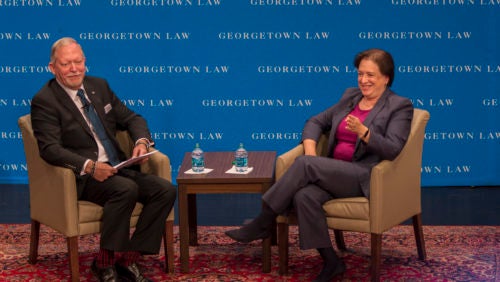Georgetown Law Hosts ABA Pro Bono Celebration with Supreme Court Justice Elena Kagan
October 29, 2018

Supreme Court Justice Elena Kagan, shown here with American Bar Association President Bob Carlson, appeared at Georgetown Law on October 24 as part of the ABA's 10th Annual Celebration of Pro Bono. (Photo courtesy American Bar Association, Media Relations.)
One of the things Supreme Court Justice Elena Kagan learned when she was dean of a law school is that lawyers do public service — and pro bono work — in many different capacities.
“I’ll bet Dean [William M.] Treanor would agree…you meet a lot of great alumni, and there’s a ton of people who followed different paths, and created different kinds of careers…,” Kagan said. “You have the people who give their whole lives to it, the people who work with public interest organizations from the moment they graduate…or the people who serve in government in the same kind of hundred-percent way.”
But many more, she noted, chart their own unique courses.
“Sometimes they are looking at law firms…and then they’ll go work in the prosecutor’s office, public defender’s office, a public interest organization, they’ll go back and forth,” said Kagan, who served as the U.S. solicitor general before being nominated to the Court by President Barack Obama in 2010. “And then there are people who spend all their time in the private sector but manage even as they are doing that to do very significant amounts of pro bono work in ways that really make a difference.”
Kagan appeared at Georgetown Law on October 24, as part of the American Bar Association’s (ABA) 10th Annual Celebration of Pro Bono; the justice served as the celebration’s honorary chair. “It’s always great to be at Georgetown,” Kagan said, as she walked onstage. “Dean Treanor and I go way back.”
A True Champion
Georgetown Law’s dean — along with George “Buck” Lewis, chair of the ABA’s Pro Bono and Public Service Committee and Bob Carlson, president of the ABA — introduced the justice. In his opening remarks, Treanor called Kagan “a true champion of pro bono work in the cause of justice.”
“This celebration of pro bono resonates with the mission of Georgetown Law,” Treanor said, noting that 1L students start their public service careers with Orientation Week projects and continue through the Law Center’s top-ranked clinics; summer fellowships; graduate fellowships such as those with the low-bono firm started by Georgetown Law, DLA Piper and Arent Fox; externships; and more.
Incoming Georgetown Law J.D. students are challenged to participate in a pro bono pledge of at least 50 hours, with students recognized for completing 100, 200 or more at graduation. Last year, students collectively did more than 32,000 hours of pro bono work; this year, students have completed almost 15,000 “and it’s still October,” the dean noted. “Our commitment to pro bono is part of what defines us as an institution.”
Hearing the numbers, Kagan (who served as dean of Harvard Law from 2003 to 2009), proposed playfully that Harvard and Georgetown Law students enter into a friendly competition. “If the dean of Harvard Law School were here, I bet he would challenge Dean Treanor to a contest,” she said, to laughter. “The real challenge for us was to create the opportunities for people to do meaningful pro bono work… We always recognized the ten students who did the most pro bono work, and these were ridiculous numbers. It was, ‘Do you guys ever go to class?’ It was breathtaking and it made me very proud.”
Role models, politics and more
In an onstage conversation with Carlson, Kagan discussed her role models including her father, who was a lawyer in New York City; and the two judges she clerked for, the late Judge Abner Mikva and the late Justice Thurgood Marshall. “To be in [the Justice Marshall chambers] was something pretty special…” Kagan said. “There you were with an icon of American history, an icon of American law — I think the greatest lawyer of the twentieth century, certainly the lawyer who most advanced justice. He was an amazing storyteller.”
Responding to a question on the dangers of politicization, or perceived politicization, with the current Court, Kagan said “it has to be a concern.”
“The most extraordinary thing about the Supreme Court in American history is that people believe in it…it has legitimacy and credibility, so even when it does things that many people disagree with…they nonetheless say, ‘we’re going to follow what the Supreme Court tells us to do…’ That’s one of the glories of our country, and a very precious thing that the Court has to be very careful to protect.”
It would be dangerous, Kagan said, to view the justices as just an extension of political processes. Half of the Supreme Court’s cases are, in fact, decided unanimously.
While there are a certain number of cases each year “where people say, there’s the Supreme Court again, doing its five-four thing…in ways that seem to reflect the party of the president who nominated us…,” she noted, “it’s not because we’re partisan in the way that people in Congress are partisan.”
“It’s because we have certain judicial philosophies, thoughts about how to interpret the Constitution…,” she said. “It’s not partisan, but you can see how people would look at it…every single one of us should think about that.”